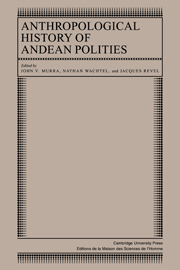Book contents
Part V - From ethnic polities to communities
Published online by Cambridge University Press: 05 October 2010
Summary
After the collapse of the Inka state, Andean societies had to endure a new kind of subordination that shattered the polities and gradually eroded ethnic differences. While these processes played themselves out, the ethnic leadership was coopted to buttress colonial rule. Annually capitanes assembled and led thousands of miners drafted for the mines of Potosi; until late in the seventeenth century they were still in charge of recognizable ethnic cohorts (such as the Carangas, the Pacajes, or the Lupaqa). It is worth asking at what point in colonial history the corregimientos still reflected ethnic lines.
Each of the polities was fragmented at a distinct historical rhythm: Changes, but also continuities, differed from region to region; even today there are differences of scale among social units, according to country. Ecuador and Bolivia tolerate larger, multivillage units, whereas “community” legislation has pulverized them in Peru.
In Part V we do not attempt to offer a survey of the many problems emerging from the imposition of a colonial system. This would require a volume of its own, if not more. The three chapters here explore a particular issue covering the whole period from the sixteenth century to our own times – namely, the transformation of a multi-ethnic world, full of large-scale societies, into “indigenous communities.” In fact, the “community” is a colonial creation, heir to the policy, after 1570, of deporting the Andean population into reducciones, strategic villages that deprived the population of ready access to their shrines and widely dispersed landholdings.
- Type
- Chapter
- Information
- Anthropological History of Andean Polities , pp. 281 - 282Publisher: Cambridge University PressPrint publication year: 1986



